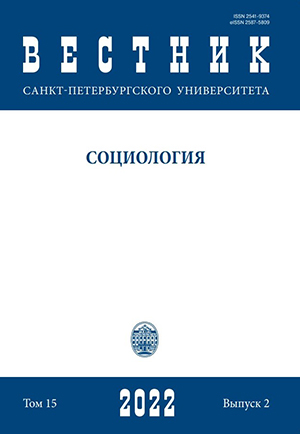Youth problems in South Korean cinema (on the material of Lee Chang-don’s film “Burning”)
DOI:
https://doi.org/10.21638/spbu12.2022.204Abstract
The article analyzes youth issues in South Korean cinematography, using the case of Lee Chang-dong’s film Burning, based on the story “Burn the Barn” by H. Murakami. The theoretical foundation of the study was the approaches of Z. Bauman, specifically his concepts of consumer society, individualized society, consequences of globalization for the individual and society, and modern retrotopia. The analysis of the film is carried using elements of system analysis, which contributes to a better disclosure of the social content of the films of G. Korte and N. A. Agafonova. The methods for collecting empirical data were the content analysis of the film, a review of an interview with director Lee Chang-dong, reviews by Russian and foreign film critics, and audience reviews that contain reactions to the social issues of the film. The works of A. Lankov, O. Kiryanov, D. Tudor, and Y. Hong, as well as publications in periodicals covering the topic, helped to understand the specifics of social problems in the context of the development of modern South Korean society. Youth problems reflected in the film Burning are considered within the framework of economic inequality and social stratification, gender inequality, the disappearing periphery (small homeland) and social perspectives in society. To represent the key problem of socio-economic stratification and inequality of life chances in the context of (post) globalization, Lee Chang-dong resorted to creating diametrically opposed types of young people. Misunderstanding and tension reign between them from the very beginning, leading to anger, which in turn comes out, and at the end of the film a tragedy occurs. The inequality depicted by Lee Chang-dong, on the one hand, is a global trend that is typical for most developed countries of the world. On the other hand, the director placed this trend in the context of modern South Korean society with its specific features.
Keywords:
youth issues, South Korean cinema, Lee Chang-dong, “Burning”, economic inequality, social stratification, gender inequality, disappearing periphery, social perspectives
Downloads
References
* Издание признано иностранным агентом.
* Издание признано иностранным агентом.
Downloads
Published
How to Cite
Issue
Section
License
Articles of "Vestnik of Saint Petersburg University. Sociology" are open access distributed under the terms of the License Agreement with Saint Petersburg State University, which permits to the authors unrestricted distribution and self-archiving free of charge.




